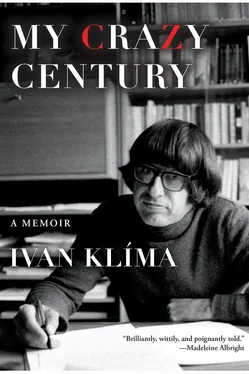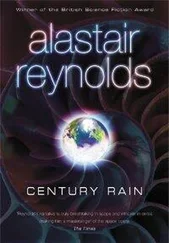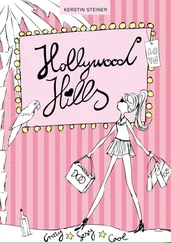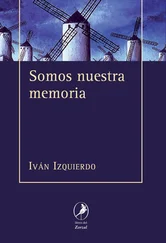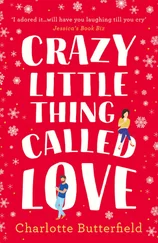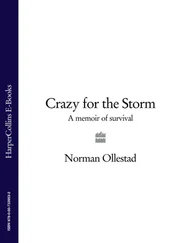Each day was like the next: The biggest events were lineups for food and water and for the bathroom and for outings in the courtyard. Mother said she would tutor me, but we had neither paper nor books, so she told me stories of long-ago times about the Emperor Charles, who founded Charles University in Prague (though I had no idea what a university was and I didn’t want to ask), and about Jan Hus, the priest they burned at the stake in Constance. My mother stressed that justice never flourished in the world, and those in possession of power would never hesitate to kill anyone who stood up to them.
My brother Jan also listened to her stories, even though he didn’t understand anything she was saying because he was barely four years old. From several toy blocks that he had brought from home, and from the sticks that we were given in winter so that we could have a fire in the stove, he would build fortresses on the floor between the mattresses.
Then Mother’s parents were also forced to come to Terezín, along with my other grandmother and Aunt Irena. They were assigned to our barracks. They told us what was going on in Prague and how the Germans were winning on every front: In Russia they were nearing the Volga River. But Grandfather claimed no one would ever defeat the Russians because Russia was huge, and no one had ever occupied it.
I was fond of Grandfather because he talked to me as though I were already grown up. He told me how our allies had betrayed us and about collaborators and Fascists who informed on anyone the Germans didn’t like.
Suddenly, in the summer of 1942, the ghetto police disappeared from the gates of our barracks and we could go into the streets of the town, which was surrounded by ramparts and deep moats. I ran outside, happy as a young goat let out of the barn, knowing nothing about his fate.
Then we were moved again, this time to the Magdeburg Barracks, where a lot of prominent people lived. They put us in a tiny room above the rear gates, where we could live with Father and the grandmothers and Grandfather and our aunt, and where there was a single piece of furniture: a battered old kitchen cabinet. Father was in charge of everything in the ghetto that had to do with the electrical power supply, and as a perk, we were allowed to live together. Next door to us were three painters with their wives and children.
One of the painters, Leo Haas, asked me if I would sit for him as a model, even in my ragged clothes with the yellow star on my jacket. I gladly obliged, not because I longed to have my portrait done, but because it allowed me to escape the dispiriting grind of life in the barracks. When Mr. Haas was finished, I plucked up my courage and asked him if he could let me have several pieces of paper. He replied that paper was a rarity even for him because he had to steal it. But he gave me a sheet and I tried to sketch a lineup for food in the forecourt.
When our Nazi jailers learned that the artists, instead of working at the tasks they were assigned, were drawing and painting scenes from the ghetto, they immediately arrested them, even though we were all de facto prisoners already. The painters ended in Auschwitz, and their wives and children were sent to the Small Fortress in Terezín. The only one to survive was Mr. Haas and, miraculously, his little son, Tomáš, who was scarcely five years old. What also survived, however, was a cache of the pictures and drawings all the painters had hidden beneath the floorboards.
*
I was too young to work and so had lots of free time. We hung out in the courtyard or behind the barracks. There was a blacksmith’s shop there where Mr. Taussig shod the horses that pulled the wagons, sometimes laden with food and sometimes with garbage or suitcases left behind by the dead. Anything that had belonged to the dead now belonged to the Germans. Mr. Taussig had a daughter, Olga, who was about my age and had long chestnut hair and seemed very pretty to me. Two large trees grew in front of the blacksmith’s shop — I think they were linden trees — and we strung a rope between the trunks and outlined a playing area with stones and then we played volleyball. I was usually one of the two captains and could choose my team. I always chose Olga first so the other captain wouldn’t take her and I then tried to play the best game I could, full of spikes so that if we won, she would know it was my doing.
We also played dodgeball and windows and doors, and we stole things. Sometimes it was coal and, very occasionally (it was too dangerous to do it often), potatoes from the cellar. Once we broke into a warehouse, where I stole a suitcase full of the sad personal effects of someone who had died, including a pair of climbing boots. Through the glassless bay windows we also tried to throw stones at the fleeing rats. I never managed to hit one, but since the barracks were infested with fleas and bedbugs, I became a champion flea catcher. When it was raining, we would simply wander up and down the corridors while I amused the others with stories. Sometimes they were stories I remembered from my Trojan War books about the wanderings of Odysseus, and sometimes I made up stories, about Indians, for instance (about whom I really knew nothing at all), or about a famous inventor who built an airplane that could fly to the moon (I knew even less about astronomy and rocketry). Then, for a short time, the Germans allowed us to put on theater performances in our barracks and even, to the accompaniment of a harmonium, operas. For the first time in my life I saw and heard The Bartered Bride.
I also started attending school in the barracks. My classmates and I had not been able to go to school for several years, so teaching us must have been hard work. The teacher was already a gray-haired lady and she spoke beautifully about literature and recited from memory poetry that had been written by people I had never heard of. At other times we would sing Moravian and Jewish songs, or she would teach us spelling. She urged us to remember everything well because the war would one day be over and we’d have to make up for the lost years of our education.
Once we were assigned a composition to describe the places we enjoyed thinking about. Most of my classmates wrote about the homes they had left behind, but I wrote about the woods in Krč and the park on Petřín Hill in Prague, even though I had probably been in either of these places only once. But in Terezín, where there was nothing but buildings, barracks, wooden houses, and crowds of people everywhere, I longed for woods and a park. Such places were as unattainable as home, but they were open and full of smells and silence.
The teacher liked my composition so much that during the next lesson she asked me to read it aloud to the others. Though they were bored, I still felt honored. Perhaps it was at this moment that the determination was born to start writing when I got home — I imagined writing whole books — but our lessons lasted no more than a few weeks, since the transports began leaving again, and one of them swallowed up our teacher. That was the last I ever heard of her.
Soon Grandma Karla fell ill; they said she had a tumor. She was bleeding and the room was full of a strange and repugnant smell. Mother wept, saying that Grandma would certainly die in such conditions, but there was no alternative. Grandma rapidly went downhill. She stopped eating and drank only water, which I brought in a bucket or in my mess tin after I stood in line for it.
Whenever she could, my mother sat by Grandma and held her hand and told her over and over again that everything would be all right, that the war would soon end, that Grandma would return home to Prague, and we would go for a walk around Petrské Square. As she spoke, her tears flowed, but Grandma didn’t see them because her eyes were shut; she didn’t respond, just breathed in and out, terribly slowly. Then Mother sent me and my brother outside and asked us to stay there for as long as possible.
Читать дальше
